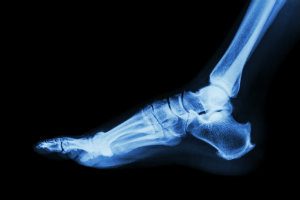Foot Pain from Tarsal Coalition

It is possible that you have had a condition called tarsal coalition since you were born, but only now that you are in your teens or early adult years are you starting to have problems with it. It is also possible, but less likely, that a former injury, infection, or arthritic disease has brought on your trouble. The condition means that you have two or more foot bones that are connected to each other by a bridge made of soft tissue fibers, cartilage, or bone.
Why You Are Having Foot Problems Now
As you grow from childhood to adulthood, your bones gradually lose their malleability and turn into hard bone (ossify). Before, when the bridge material is softer, the joints between the tarsal bones in the back part of your foot—calcaneus (heel bone), talus, navicular, cubuoid, cuneiform—can still move somewhat as you take steps. Now that the bones are hardening, the joints stiffen up and become painful.
How to Know If You Have Tarsal Coalition
It’s not something that can be seen from outside the foot, but certain symptoms may indicate a problem. An increasing level of pain in the midfoot is one indicator. It is usually worse while you are standing, walking or running, and can cause you to walk with a limp. Other things you may notice are increasing stiffness in your feet, legs that feel tired, a flattening of the foot arch, and possibly muscle spasms that tend to pull your foot out to the side.
If you experience these, call Southern California Foot & Ankle Specialists. We will analyze your history of symptoms, do a physical exam, and use X-rays or other imaging tests to confirm the diagnosis.
Deciding about Surgery for Connected Bones
We will first try to reduce your symptoms with conservative treatments to control pain or limit joint motion. These may include physical therapy, steroid injections, padding or orthotics in your shoes, ultrasound, casting and crutches, or oral and injected pain relievers. These may help for a while, but the underlying condition is still there, so the pain could return at any time.
When pain becomes chronic or severe, surgery may be necessary. There are many reasons for and against doing a procedure, so we will talk over your options and help you choose the one you are most comfortable with. If you decide to go ahead, go with the confidence that Dr. Robert Spencer and Dr. Nitza Rodriguez are excellent podiatric surgeons who have a particular understanding of your feet and the skills necessary to correct the coalition.
We might add that sometimes tarsal coalition surgery is more successful when done before the bones have fully hardened. Younger bones can still grow and form new tissue to adapt themselves better after resection (removal of the bridge). In older patients, this is less likely to happen and could mean the bones may eventually need to be fused to prevent pain.
Take Your Foot Pain to the SoCal Experts
If you suspect tarsal coalition or have any other issue that is making your feet ache, don’t hesitate to call Southern California Foot & Ankle Specialists in Ladera Ranch, CA by dialing (949) 364-9255 (WALK). We serve patients from all over Southern Orange County and are known for our expertise in treating foot deformities of all types, including clubfoot, vertical talus, short toes, and more.
You can schedule an appointment right here on our website, and also explore what else we can do for your feet. We invite you to stay in touch with us on our Facebook page, follow us on Twitter, or find items of interest on our Pinterest boards as well. We want to be your go-to place for all your family’s foot care!
Contact Us
Robert Spencer, DPM
Nitza Rodriguez, DPM
Mario Porciello, DPM
Map & Directions
333 Corporate Drive, Suite 230, Ladera Ranch, CA 92694
Tel: (949) 364-9255 (WALK)
Fax: (949) 364-9250
Office Hours:
Monday - Friday: 9am - 5pm
*(Lunch 12 noon - 1pm)
